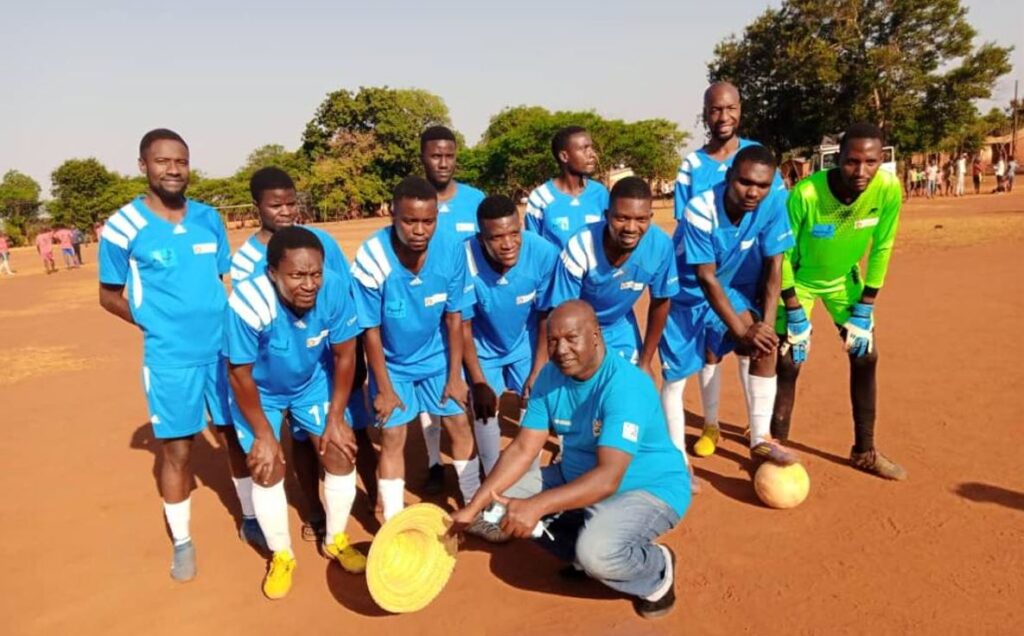Lilongwe, Malawi–When the Mdulidwe Stars take the football field, there’s more at stake than scoring goals. In the Chichewa language, the team’s name means Circumcision Stars and several players will spend halftime explaining to the crowd the health benefits of voluntary medical male circumcision, or VMMC. Richard Mvula, a well-known football player in the Mitundu community, was impressed by what he heard during a summer match against the Stars.
“I have been hearing about VMMC, but I never knew that it was one way of preventing HIV infection,” said Mvula, a sexually active 24-year-old. “All this time, I thought circumcision is just a rite of passage to manhood for other cultures. Hearing all these benefits about VMMC has really changed the way I perceive circumcision. I was so amazed to hear that medical circumcision provides partial protection from HIV infection.”
The Stars educators, led by Jhpiego players, explained to the mostly adult men that VMMC can reduce the risk of female-to-male HIV transmission by 70%. That sounded good to Mvula, who, after the game, went with his teammates and other football fans to the Mitundu Health Center for screening and the procedure.
Scaling up evidence-based HIV prevention interventions, such as VMMC, in districts with high HIV prevalence is essential to achieving epidemic control in Malawi. By the end of 2021, an estimated 216,347 men had undergone VMMC for HIV prevention in Lilongwe district—only about half of the population of uncircumcised men in the district.

As in Lilongwe, VMMC uptake among men across Malawi is generally low. Without detailed information about the health benefits of VMMC, some communities resist accessing VMMC services for cultural reasons. Responding to this challenge, Jhpiego’s Project Dolo, which is funded by the U.S. President’s Emergency Plan for AIDS Relief through the Centers for Disease Control and Prevention, initiated football tournaments—or bonanzas—as a venue for educating men on HIV and VMMC.
“Through the years of implementing VMMC programs, we have learned that there’s a need to better understand the barriers keeping men from receiving VMMC services,” said Geoffrey Menego, the Dolo project director. “In our case, we understand there are so many misconceptions around VMMC in Lilongwe district . . . most men are not aware of the health benefits of VMMC.
“Football is the most famous game known worldwide. We have infused football in generating demand for VMMC as a means of penetrating areas that resist VMMC messages due to cultural, social and religious beliefs. Being a popular sport in Malawi and with strong networks and teams to the lowest levels in the community, it [would] have been a huge missed opportunity not to explore this strategy,” Menego explained.
Jhpiego recruited players for the Mdulidwe Stars from within the Jhpiego Malawi office—communicators and mobilizers, VMMC providers, data clerks, hygienists and office assistants. To ensure good attendance at the matches, community mobilizers assist in identifying popular football teams. They also promote the matches in trading centers, schools, markets and churches. In some instances, they use local radio stations and text messaging to advertise upcoming tournaments.
The football matches are well patronized in the urban and rural areas of Lilongwe. At the matches, community mobilizers reach out to patrons in small groups and one to one. This gives patrons a chance to ask questions about VMMC, which helps to clear up misconceptions and fears that surround the procedure. The project also uses these gatherings to distribute COVID-19 messages.
Menego said the bonanzas have proven to be a cost-effective way to bring men together in a safe space. The events have reached 30,000 people with HIV prevention information, and, like Mvula and his teammates, men are already coming forward for VMMC services.
Since 2012, Jhpiego has reached more than 374,000 men with quality VMMC services in Chikwawa, Lilongwe, Thyolo and Zomba districts in Malawi. That’s more than a third of Malawi’s goal of 940,000 men receiving VMMC by 2025.
In Lilongwe district, Project Dolo continues to provide VMMC services and generate demand for those services using multifaceted strategies, including football bonanzas and the Mdulidwe Stars.
Sarah Sakanda is a knowledge and communications specialist with Jhpiego Malawi.



